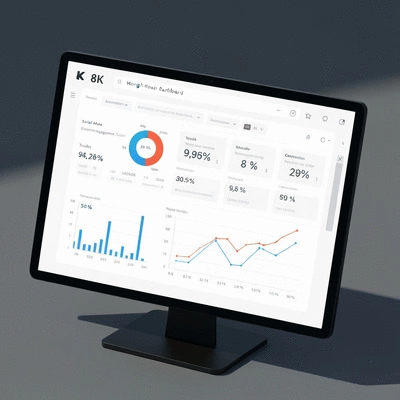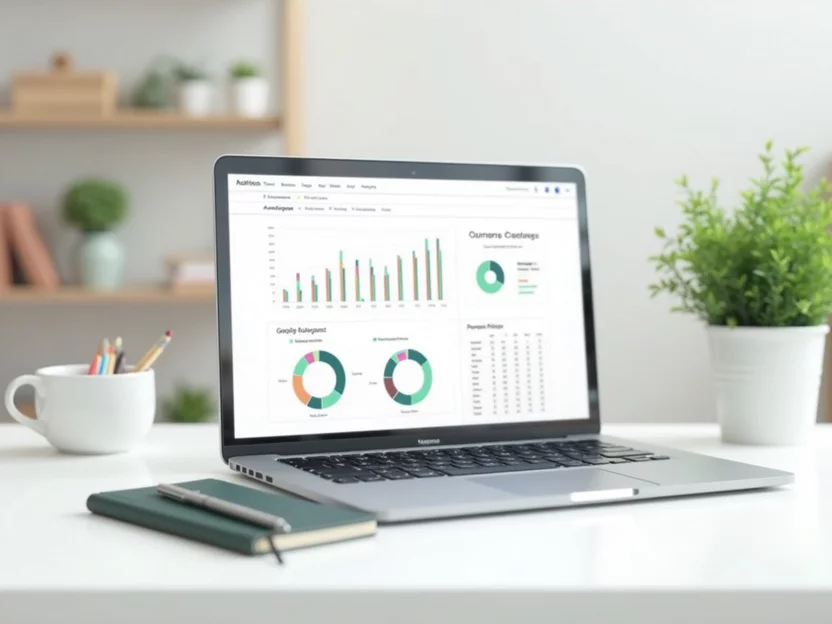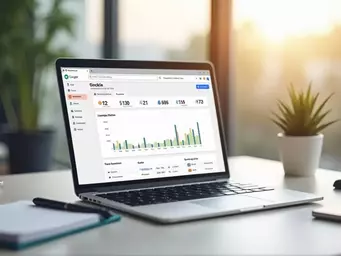Nov 14
Automate Reporting with Google Sheets
In the fast-paced realm of digital marketing, efficiency is key. Imagine a scenario where your team can focus solely on delivering exceptional value to clients, rather than drowning in tedious reporting tasks. This isn't just a dream; it's a tangible reality when you harness the automation power of Google Sheets.
What You Will Learn
- Automation minimizes manual data entry, saving time and reducing errors.
- Google Sheets features like data linking and real-time collaboration enhance reporting efficiency.
- Effective data visualization techniques clarify insights for clients, making reports more impactful.
- Implementing data governance and security measures is crucial for compliance and client trust.
- Utilizing Google Apps Script allows for customized automation solutions tailored to specific agency needs.
- Scalable reporting processes prepare agencies for growth without sacrificing quality.
- Leveraging performance dashboards can significantly enhance the clarity of key performance indicators.
Automating Reporting with Google Sheets: Benefits & Considerations
This visual summarizes the key benefits, compliance considerations, and future scalability aspects of automating reporting using Google Sheets for digital agencies.
Benefits of Automation
- ✓Enhanced Efficiency & Reduced Errors
- ✓Real-Time Data Updates & Dashboards
- ✓Custom Automation with Apps Script
Compliance & Security
- ⚠Data Governance & Client Privacy
- ⚠Maintaining Data Integrity
- ⚠Regular Audits & Access Controls
Scalability & Advanced Use Cases
- ▲Scaling Reporting Processes (Modular Workflows)
- ▲Custom Metrics & Multi-Source Data Blending
- ▲Leveraging Performance Dashboards
Actionable Next Steps
- →Evaluate Agency's Readiness for Automation
- →Start Small & Leverage Templates
- →Gather Feedback & Stay Informed
Leveraging Google Sheets for Streamlined Automated Reporting
As a digital agency, we often face common challenges when it comes to reporting tasks. Manual reporting can be time-consuming, prone to errors, and a significant drain on resources. That's where automation steps in! By leveraging tools like Google Sheets, we can transform our reporting processes, making them more efficient and accurate. To explore more about workflow automation, check out these workflow automation ideas for agencies.
Imagine spending hours compiling data from various sources only to realize that a simple typo skewed your entire report. Automation helps avoid these pitfalls, allowing you to focus on what truly matters: delivering exceptional value to your clients.
Understanding the Need for Automation in Digital Agencies
In the fast-paced world of digital marketing, time is of the essence. Agencies like ours often juggle multiple clients, each requiring tailored reports and insights. This juggling act can lead to missed deadlines and client dissatisfaction. Automation addresses these issues by:
- Reducing manual data entry: Saves time and minimizes errors.
- Streamlining processes: Allows us to manage client data more effectively.
- Enhancing client communication: Provides timely insights that keep clients informed.
By embracing automation, we position ourselves not just as service providers, but as strategic partners in our clients’ growth journeys.

How Google Sheets Facilitates Marketing Reporting Automation
Google Sheets is a powerful tool for marketing reporting, and its automation capabilities are often underutilized. With features like formulas, pivot tables, and built-in integrations, it can handle various reporting tasks with ease. For instance:
- Data linking: Connects data from different Sheets and sources.
- Automated calculations: Uses formulas to process data automatically.
- Real-time collaboration: Allows team members to update reports simultaneously.
These features empower agencies to create dynamic reports that are not only comprehensive but also responsive to real-time data changes. For more insights on how to streamline client reporting, refer to streamlining reporting for digital agencies.
Data Visualization Techniques in Google Sheets
Effective reporting is not just about data; it's about how that data is presented. Google Sheets offers various data visualization techniques that enhance clarity and impact. Consider the following methods:
- Charts and graphs: Visually represent data trends.
- Conditional formatting: Highlight important metrics with color-coding.
- Dashboards: Create a centralized view of key performance indicators.
By utilizing these techniques, we can make our reports not only informative but also visually appealing, ensuring that our clients grasp the insights quickly and effortlessly.
Key Benefits of Automating Reporting with Google Sheets
Enhancing Efficiency and Reducing Errors
One of the primary advantages of automation is the significant enhancement of efficiency. By automating reporting tasks, we can reduce manual data entry, which not only saves time but also minimizes human error. This leads to:
- More accurate reports: Trustworthy data for better decision-making.
- Increased productivity: Focus on strategic growth rather than repetitive tasks.
- Improved client satisfaction: Timely delivery of insights enhances relationships.
Automation is not just a luxury; it’s a necessity for agencies aiming to thrive in today’s competitive landscape.
Real-Time Data Updates and Dashboards
Google Sheets serves as a dynamic dashboard, providing live data updates that keep everyone on the same page. This feature is invaluable for agencies, as it ensures that our reports reflect the most current data available. With real-time updates, we can:
- Quickly adjust strategies based on performance metrics.
- Share instant insights with clients and stakeholders.
- React to data changes effectively, enhancing decision-making.
The ability to visualize real-time data fosters a proactive approach to client management, positioning us as leaders in our field.
Utilizing Google Apps Script for Custom Automation
For those looking to take automation a step further, Google Apps Script offers the ability to create custom functions and workflows. This powerful tool allows agencies to:
- Automate repetitive tasks: Set up scripts to handle recurring reporting activities.
- Integrate with other services: Connect Sheets to various APIs for streamlined data input.
- Enhance functionality: Build tailored solutions to meet specific business needs.
By harnessing the power of Google Apps Script, we can build a more customized and efficient reporting system that aligns perfectly with our agency's objectives.

Pro Tip
To maximize the benefits of automation in your reporting processes, consider integrating Google Sheets with tools like Zapier or n8n. These platforms can automate data transfers, ensuring that your reports are always updated with the latest information, saving you time and reducing the chance of human error.
Ensuring Compliance and Security in Reporting Automation
In today's data-driven world, ensuring compliance and security in automated reporting is paramount for digital agencies. With regulations like GDPR and CCPA, it’s crucial to safeguard client data and maintain transparency in how it is handled. By embedding compliance into your reporting workflows, you not only protect your agency but also build trust with your clients. This trust can be a competitive advantage in a crowded marketplace.
Failure to comply with data governance standards can lead to hefty fines and damage to your agency's reputation. Therefore, establishing clear data governance policies should be on the front burner for any agency leveraging automated reporting solutions. Remember, keeping your client's data secure is not just a regulatory requirement; it's also a matter of professional integrity! You can find more information about choosing the right automation tool to help with compliance here.
Data Governance and Client Privacy Considerations
When you integrate automation tools into your reporting processes, it’s essential to prioritize data governance. This means understanding the types of data you collect, how it’s stored, and who has access to it. Here are some key considerations:
- Data Minimization: Only collect data that is necessary for reporting purposes.
- Access Controls: Limit access to sensitive data to only those who need it for their work.
- Regular Audits: Conduct audits to ensure compliance with privacy regulations and internal policies.
- Training Staff: Regularly train your team on compliance best practices and data security protocols.
By implementing these strategies, you can ensure that your automated reporting is not only effective but also secure. This is especially crucial for agencies that handle sensitive client information, like financial data or personal identifiers.
Strategies for Maintaining Data Integrity
Maintaining the integrity of your data is vital to delivering accurate reports. Here are some best practices to consider when using automated reporting tools like Google Sheets:
- Validation Rules: Use validation rules in Google Sheets to prevent incorrect data entry.
- Regular Backups: Create regular backups of your data to prevent loss due to errors or technical failures.
- Version Control: Utilize version history to track changes and revert to earlier versions if needed.
- Data Quality Checks: Implement periodic checks to ensure data accuracy and consistency.
By following these strategies, you can significantly reduce the risk of errors that could compromise your reporting. Investing in data integrity not only enhances your reports’ reliability but also supports your agency's reputation as a trustworthy partner for clients.
Preparing for the Future: Scalability and Advanced Use Cases
As your agency grows, so do your reporting needs. Preparing for scalability in your reporting processes ensures that you can handle increased demands without compromising quality. In my experience at Automate Success, I’ve seen many agencies struggle with this transition. Let's explore some strategies to facilitate smooth scaling.
Scaling Reporting Processes for Growing Agencies
When scaling your agency, consider the following performance considerations to streamline your reporting:
- Automation Tools: Leverage tools that can handle larger datasets and more complex integrations.
- Cloud Storage: Use cloud storage solutions to manage and access data across multiple devices and locations.
- Modular Workflows: Design workflows that can be easily adjusted or expanded as your agency grows.
- Performance Monitoring: Regularly assess the performance of your reports to identify bottlenecks.
By implementing these strategies, you can ensure that your reporting processes can adapt to your agency’s evolving needs. Remember, a flexible reporting system is a key ingredient for sustainable growth!
Custom Metrics and Multi-Source Data Blending
In the realm of automated reporting, the ability to blend data from multiple sources opens up a world of possibilities. Here are some advanced use cases that can elevate your reporting game:
- Custom Metrics: Create metrics that specifically align with your clients' business objectives.
- Data Blending: Combine data from platforms like Google Analytics, Facebook Ads, and CRM systems for comprehensive insights.
- Cross-Platform Analysis: Analyze performance across different marketing channels to identify trends and opportunities.
These advanced reporting techniques not only provide richer insights but also position your agency as a leader in data-driven decision-making.
Leveraging Performance Dashboards for Enhanced Insights
Performance dashboards are powerful tools for visualizing key performance indicators (KPIs) effectively. By utilizing Google Sheets, you can create dynamic dashboards that present data in an easily digestible format. Here’s how to get started:
- Identify Key Metrics: Determine which KPIs are most relevant to your clients and their objectives.
- Design a User-Friendly Layout: Organize your dashboard so that it highlights the most critical information first.
- Use Visual Aids: Incorporate charts and graphs to make data interpretation easier for clients.
- Automate Updates: Set up your dashboard to automatically refresh with the latest data for real-time insights.
By leveraging performance dashboards, you can enhance your reporting’s clarity and impact, ensuring clients get the most out of their data.
Final Thoughts on Automated Reporting with Google Sheets
As we wrap up this discussion, I encourage you to reflect on your current reporting processes. Are they streamlined and effective? Do you feel your agency is ready to embrace automation? Understanding your current state is the first step towards implementing solutions that will elevate your operations.
Evaluating Your Agency's Readiness for Automation
Assessing your agency's readiness for automation involves a few key questions:
- What are the biggest pain points in your current reporting process?
- How much time do team members spend on manual reporting tasks?
- What tools and resources do you currently have to facilitate automation?
- Are your team members open to adopting new technologies?
By answering these questions, you can gain insights into where to focus your efforts as you transition to automated reporting.
Taking Action: Next Steps for Implementation
Ready to take the plunge? Here are some actionable next steps to start implementing automated reporting solutions with Google Sheets:
- Start Small: Begin with one reporting task that can be automated and scale up from there.
- Leverage Existing Templates: Use pre-built templates to get started quickly.
- Gather Feedback: Encourage your team to provide feedback on new workflows for continuous improvement.
- Stay Informed: Keep up with updates and new features in Google Sheets that could enhance your reporting capabilities.
By taking these next steps, you're not just improving your agency's efficiency; you're positioning yourself as a thought leader in the increasingly competitive digital landscape. Let's make automation work for you!
Recap of Key Points
Here is a quick recap of the important points discussed in the article:
- Automation reduces manual data entry, saving time and minimizing errors.
- Google Sheets offers powerful features like data linking, automated calculations, and real-time collaboration for effective reporting.
- Utilizing data visualization techniques, such as charts and dashboards, enhances report clarity and impact.
- Ensuring compliance and data security is crucial when implementing automated reporting solutions.
- Strategies like data validation, regular backups, and audits help maintain data integrity.
- Preparing for scalability in reporting processes ensures agencies can adapt to growing demands without compromising quality.
Frequently Asked Questions (FAQs)
What are the primary benefits of automating reporting with Google Sheets for digital agencies?
How does Google Sheets facilitate marketing reporting automation?
What data visualization techniques can be used in Google Sheets to improve reports?
Why is compliance and security important in automated reporting, and how can agencies ensure it?
How can Google Apps Script be utilized for custom automation in reporting?
What strategies help ensure scalability in reporting processes for growing agencies?

Sophie Langley
Automation strategist. Digital consultant. Systems-led growth advocate.
Sophie Langley is dedicated to transforming digital agencies into efficient, systems-driven operations, empowering agency owners to embrace a future of sustainable growth. Join her on our blog for cutting-edge insights and tailored strategies that streamline your workflows and enhance your client success.


